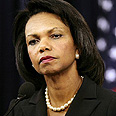

The city is on Georgia's main east-west road. The Russian troops' presence there effectively cuts the country in two.
A Georgia Interior Ministry spokesman says there are no Russian troops in the second-largest city of Kutaisi, despite reports they were headed in that direction overnight.
Choosing expediency over principle, the United States and its allies are pushing Georgia's pro-Western government to accept major concessions in a ceasefire with Russia.
Despite warnings of serious consequences for Russia for its invasion of the former Soviet republic, Secretary of State Condoleezza Rice arrived in Georgia on Friday to try to persuade its leadership to agree to a deal that expands the mandate of Russian troops on Georgian territory.
Rice said the proposed ceasefire she wants Georgia to sign with Russia protects Georgia's interests despite concessions to Moscow. She told reporters traveling with her to Tbilisi that the immediate goal is to get Russian combat forces out of Georgia and that more difficult questions can be addressed later. But she said the US would never ask Georgia to agree to something that isn't in its best interests.
"I'm going now to talk to President Saakashvili about the clarifications that the French have provided and then we'll try to get this formal ceasefire in place because the goal of this is to get a ceasefire and to get Russian forces to withdraw from the country ASAP," Rice said.
The French-mediated proposal calls for the immediate withdrawal of Russian combat troops from Georgia, but allows Russian peacekeepers who were in the flashpoint separatist area of South Ossetia before last week's explosion of violence to remain and take a greater role there.
The draft document also does not commit Russia to respecting Georgia's "territorial integrity" but rather refers to Georgian "independence" and "sovereignty," meaning Moscow does not necessarily accept that South Ossetia and another disputed region, Abkhazia, are Georgian.
The proposed ceasefire appears to back down on previous demands from the United States and its European allies that Russia halt all military activity in Georgia and that Georgia's "territorial integrity" must be respected.
The details were described to The Associated Press by US and European diplomats familiar with negotiations this week between French President Nicolas Sarkozy, Russian President Dmitry Medvedev, Russian Prime Minister Vladimir Putin and Georgian President Mikhail Saakashvili.
The diplomats spoke on condition of anonymity because the agreement was not yet finalized.
Imperfect peace plan
US officials involved in the negotiations conceded the agreement was not a perfect solution but said the primary goal was to get Russian combat troops out of South Ossetia, Abkhazia and Georgia proper as soon as possible.
"It can't be open-ended, either geographically or in time," one official said, referring to the expanded Russian patrols. "It has to be circumscribed and it's got to be in the context of the Russians withdrawing all their armed forces."
If agreed, the ceasefire would allow the Russian peacekeepers in South Ossetia to stay and henceforth be permitted to patrol in a strip up to 10 kilometers (6.2 miles) outside the area, the US officials said.
The concession was demanded by Russia, which accuses Georgian forces of attacking the peacekeepers and pro-Russian South Ossetians who live there. Georgia's military move to regain control of the region prompted Russia to launch its invasion.
Russian patrols outside South Ossetia proper would stop once a new international peacekeeping and monitoring force is in place, one US official said, adding that the Russians would not be allowed to use the 6.2-mile band "to impede legitimate Georgian movement."
However, the Russians' rules of engagement in the band have not been determined and it was not clear when a new international force could be raised to monitor the situation and keep the peace.
The cease-fire also would allow Russian peacekeepers to remain in Abkhazia, the second, and larger, disputed province. Those forces would not be given the expanded patrol rights, officials said.
Sarkozy, who met Rice in southern France on Thursday, said he believed Russia would begin to withdraw its troops if Saakashvili signs the deal that Rice is bringing.
"If tomorrow, President Saakashvili signs these documents, then the withdrawal of the Russian troops can start," he said.
Should Saakashvili sign, Medvedev has indicated that he also will sign, officials said. Left unsaid, however, was the refusal of Russia to agree to respect Georgia's "territorial integrity."
Russian Foreign Minister Sergey Lavrov on Thursday dismissed that notion, saying the world should "forget" about the idea, drawing rebukes from President Bush and Rice who said the United States firmly supports Georgia's territorial integrity.
"The United States of America stands strongly, as the president of France just said, for the territorial integrity of Georgia," Rice said. "This is a member state of the United Nations and its internationally recognized borders need to be respected."
Reuters contributed to this report















